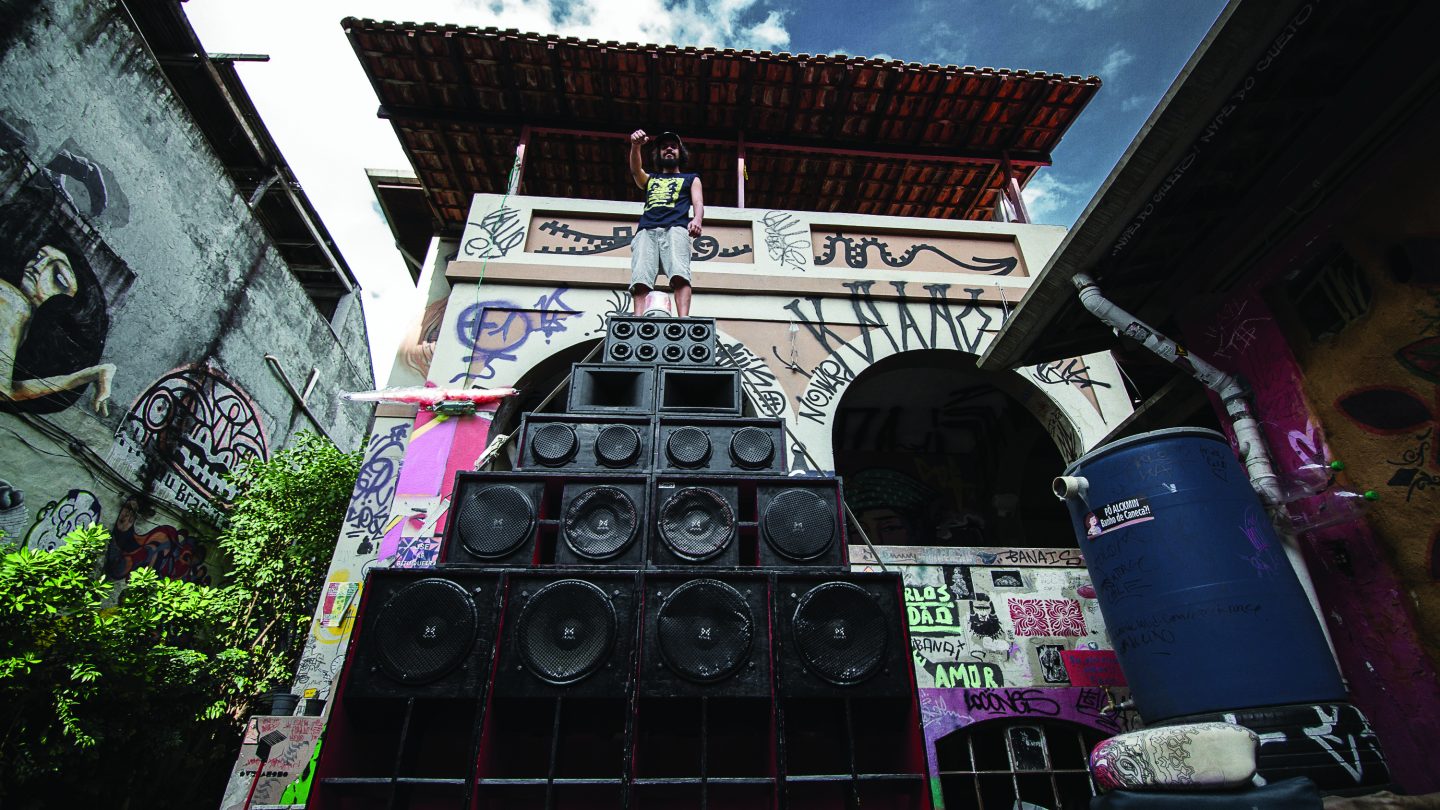‘We just push and push with our fire to make change across Brazil…’ Felipe?Altenfelder, Fora Do?Eixo
When three University students?in the city of Cuiabá, Brazil,?became?frustrated?that most?opportunities?for?musicians and artists?were?confined to Rio and Sao Paulo, they?decided to create?a?community?to support the?music scene?in their hometown.
The students,?Pablo?Capile,?Talles?Lopes and Felipe?Altenfelder,?called their  collective?Espaco?Cubo.?They had no idea?that this project?would go on to?become?the largest?cultural?movement?in Brazil?today,?known as?Circuito?Foro?Do?Eixo?(The?Off-Axis Circuit) or simply?Foro?Do?Eixo?(FdE).?Constantly evolving and hard to define,?FdE?is a network of musicians, artists,?festivals, collectives, and cultural venues, which reaches out to the periphery of Brazil and proposes alternatives to the?traditional?Brazilian music scene.
collective?Espaco?Cubo.?They had no idea?that this project?would go on to?become?the largest?cultural?movement?in Brazil?today,?known as?Circuito?Foro?Do?Eixo?(The?Off-Axis Circuit) or simply?Foro?Do?Eixo?(FdE).?Constantly evolving and hard to define,?FdE?is a network of musicians, artists,?festivals, collectives, and cultural venues, which reaches out to the periphery of Brazil and proposes alternatives to the?traditional?Brazilian music scene.
Espaco?Cubo,?enabled musicians to rehearse and record?through a system of exchange
economy:?swapping?their skills for studio time. The musicians would build?websites,?run the bar?at a gig?or engineer in the studio. The?public?brought money into the system?by buying?tickets to watch the bands.?Soon a?vibrant music scene developed in Cuiabá.?This was the birth of?Fora Do?Eixo.
The founders of?FdE?shared their ideas freely and soon producers and musicians in different cities?organised?similar systems.?They?set up?casas?(houses) where?the?FdE?community could?live?and?eat?for free in exchange for using their skills to collaborate on projects.?FdE?now have their own?‘complementary economy’ with a Collective Bank and?currency, the?Card?Cubo, which enables them to?generate millions each year for the independent music scene.
Fora Do?Eixo?Statistics
- 200 collectives across Brazil
- 2000 employees (of which 1000 are full time)
- The network reaches 8 million people
- Now working across 15 countries
- 6000 shows produced per year
- 30,000 artists circulated
- 150 permanent offices and 300 temporary ones
- Grito?Rock?takes place in one month in 300 cities and 30 countries
- The network organises 150 tours per year averaging 12 shows per tour
(Stats?from Education IPOW, 2012)?
In 2007?FdE?started?Grito?Rock, their flagship festival,?as an alternative?to?the infamous?Rio Carnival.?FdE?believed?that?the?Carnival?didn’t represent the true cultural variation across Brazil, particularly the rock, metal and electronic music scenes.?Grito?Rock?was hugely popular and quickly spread across Brazil and then?beyond?–?in 2014?Grito?Rock?events were hosted in 500 cities across the?world.?It?is globally recognised as a?platform for?the?exchange of?production?technology and knowledge?and a space where?independent producers?can connect.
If?Grito?Rock?is more than a music festival it is because?FdE?is more than a creative collective; it is a socio-cultural movement that responds to?the?changing?needs of its?community. They have?even?set up?their own education system, the University, where new generations?of artists and producers?can learn organically by?participating in?projects.
In 2011, during public protests in Sao Paulo,?FdE?members?used?their online platforms to broadcast live footage of what was happening on the streets. They believed that?the public needed a voice in response to the?reportage of the?traditional?media?channels. This idea of citizen journalism became?Midia?Ninja. Midia Ninja?became?widely?respected for?their extensive,?up-close reporting during?protests?triggered by the Confederacy Cup in 2013 and?World Cup in 2014.
In Place of War, a UK based organisation?that supports artists?in sites of conflict, has been working with?FdE?over?the past five years – joining them on the frontline during the?2013-2014?protests?-??and helping?to?share their ideas across the world. Later this year?In Place of War?will take twenty young African cultural leaders to Brazil to experience?FdE’s?‘casas’?and the systems they?have put into place,?to see how?it could work across the Sub-Saharan African continent.
The?FdE?story?is?still?unfolding;?as it grows it continues to?change?the lives of aspiring musicians and artists?in Brazil and beyond.?You can keep up with developments here:
At?Shambala?2015,?In Place of War?presented?a line-up of acts from Venezuela, Zimbabwe, Zambia, Burundi and Kurdistan performing a range of styles from dancehall to hip-hop to traditional rhythms of the Caribbean.
Inspired by the?FdE?movement and its success, Jeff Thompson,?co-founder of?Un-Convention?and the?Future Artists Live Creative Co-op,?decided to set up a similar collective network of artists here in the UK. Formed in 2014, the?Off Axis Touring Network?now has bands and artists from over 50 towns and cities across the UK.
“It’s?a system based on camaraderie and mutual benefit, rather than industry gatekeepers. It means artists can focus on what is achievable and viable,?in building?their local audience, but at the same time creating opportunities for other artists?who share their ethos. It’s a win?win?system in that regard.? It opens up almost every town and city in the country as a viable touring destination.”?Jeff Thompson,?co-founder of?the?Future Artists Live Creative Co-op


